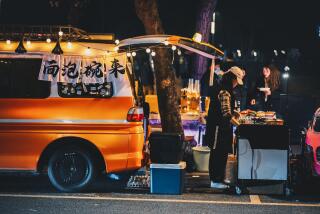A Chinese City’s Porters Carry the Weight of History
- Share via
CHONGQING, China — Modernity glistens off a million surfaces of this bustling city, from the downtown high-rise office windows to the golden arches that invite diners in for a quick han-bao-bao and fries.
But on every street corner stand human reminders of Chongqing’s centuries-old past: men who sell their strength for a living, and who easily pick out a customer’s call through the buzz of a noisy crowd.
“Bang-bang! Bang-bang!” goes the cry.
With stout bamboo poles slung on their shoulders, the men scurry over to their summoner, who points at various bags and parcels to be transported. One man can usually handle the lot, suspending the items on opposite ends of the pole. He then carries the load like a yoke to wherever the customer orders -- in exchange for less than a dollar.
These workers form Chongqing’s army of “bang-bang men,” plying a backbreaking trade that has existed here since imperial times and that relies on nothing except muscle.
Similar jobs involving brute strength for hire have faded from the scene in China, banned as demeaning feudal practices by the Communists who took power in 1949. Rickshaws are a relic of the past. Nobody rides around in sedan chairs anymore.
But the bang-bang men have remained a fixture on the landscape here, another of the jarring juxtapositions of old and new in a country that is changing at dizzying speed.
Chongqing’s landscape is partly what gave rise to the bang-bang men -- and why residents continue to think of them as a necessity. The city, which sits at the confluence of two rivers, is extremely hilly, which made it difficult in the days before mechanization for ordinary people to transport heavy objects, even for short distances.
The invention of the bicycle didn’t help much; hardly a bike is to be seen in Chongqing because of its rolling terrain. Although cars now zip around town on the well-paved boulevards, taxis are still regarded as too expensive for such mundane tasks as hauling a package to a home within walking distance.
So the bang-bang men -- their name, pronounced bong-bong, comes from the local dialect and refers to their bamboo poles -- are a ubiquitous sight. They shuffle along in their shabby shoes, their shoulders sagging from the weight of all manner of goods that have to get from point A to point B.
Stores dispatch bang-bang men to deliver television sets, stereo equipment, containers full of chemicals or huge blocks of ice. Residents hire them to haul their groceries or take their suitcases down to the dock. One recent afternoon, four hard-breathing bang-bang workers carried a massive metal turbine between them, their poles interlocking to distribute the weight, their grunts punctuating the whoosh of passing traffic.
At times, Chongqing -- China’s most populous city -- resembles a giant outdoor hotel, with tens of thousands of porters waiting for work, eking out a meager living from the tips that the better-off bestow on them for their trouble.
“Chongqing is a mountainous city. There are steep slopes and tall buildings without elevators, so people need us,” said Huang Qianfu as he waited for someone to hire him.
A new father at 30, Huang doesn’t look particularly brawny, but he has carried up to 200 pounds of goods at once.
“We’re cheap compared to other methods” of transport, he said. “Take a taxi.... That’ll cost you at least 5 yuan [about 60 cents]. I only charge 3 to 4.”
Like most bang-bang men these days, Huang is a farmer who comes to Chongqing in search of work in the off-season. In cities throughout China, migrant rural laborers perform the menial, manual work that increasingly prosperous city folk consider to be beneath them.
Life in the big city is hard for the bang-bang men, whose numbers may be as high as 200,000, according to one estimate. They often live in tenements, with many sharing a single rundown room. Competition for work can be fierce, as are occasional turf battles. Popular beats include the wharves along the Yangtze River, where bang-bang men have been ferrying goods to and fro for cargo ships and passengers since at least the Ming Dynasty (1368-1644).
Another coveted area is “Appliance Alley,” a downtown stretch of shops specializing in electronics. Men mill around, hoping for a commission to haul merchandise they can almost never hope to buy themselves.
On average, bang-bang workers earn $60 to $75 a month; a good month brings in about $120. The lion’s share of their earnings often gets sent back to their families in the countryside.
“I don’t want to be a bang-bang, [but] I can’t find other work in Chongqing,” Huang said.
To film director Shu Yide, the hardscrabble lives of the bang-bang men seemed the perfect subject for dramatic treatment. In 1996, he shot a television miniseries chronicling the vicissitudes of a group of fictional farmers who find work in Chongqing as bang-bang workers. The characters work hard to save up money for different reasons: one to afford a wife, another to go to college, a third to pay his children’s school fees.
To prep them for their roles, Shu had his local actors spend 10 days on the streets selling their muscle power.
On one occasion, two of them were hired to deliver a refrigerator to a customer who lived on the ninth floor. Their tip: about 60 cents between them, which was considered generous.
“Bang-Bang Army,” Shu’s 20-part miniseries, proved popular with audiences across China. Its success vindicated his efforts, which at first met with a chilly reception from the then-chief of Chongqing’s propaganda department, who thought that the drama made the city appear backward and laughable.
“Later, the department chief went to the central party school in Beijing to study, and at the time, Beijing was broadcasting ‘Bang-Bang Army,’ ” Shu said. “He said he was very embarrassed and afraid that the other cadres would ridicule him for Chongqing’s backwardness. Instead, they congratulated him on having produced such a good series.”
Shu was encouraged to make the program by a boss who wanted some record of bang-bang men before they disappear from Chongqing as private car ownership rises.
That day seems far off to Meng Qimin, a farmer who has been doing porter work for seven years to supplement his household income.
“It’s a very tiring job, but no pain, no gain,” said Meng, 47. “I can do it for a few more years. After I turn 50, I might not be able to anymore.”
More to Read
Sign up for Essential California
The most important California stories and recommendations in your inbox every morning.
You may occasionally receive promotional content from the Los Angeles Times.














